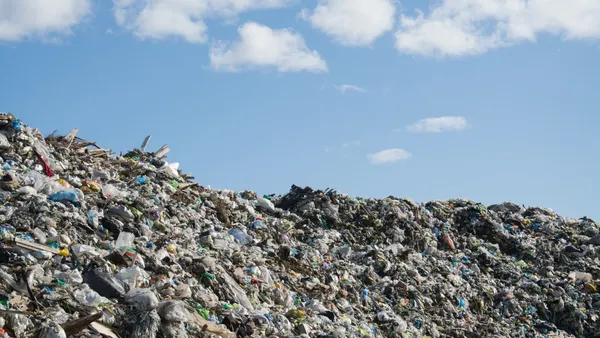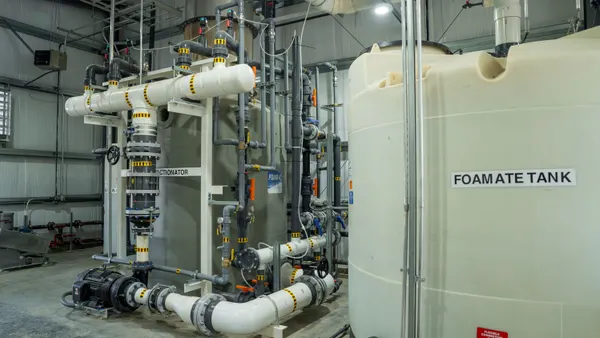Dive Brief:
- New Mexico has designated specific types of PFAS-containing firefighting foam as hazardous waste and has banned most products containing intentionally added PFAS. The two new laws are part of a bill package Gov. Michjelle Lujan Grisham signed into law on Tuesday.
- The new designation of PFAS-laden firefighting foams as hazardous waste is an important step to allow the state to regulate the material and mandate cleanups, absent federal restrictions on the material, Lujan Grisham said during the bill signing.
- New Mexico is now the third state to ban intentionally added PFAS in all categories of consumer products, but the legislation exempts some “critical applications” in manufacturing, medical and electronics sectors.
Dive Insight:
New Mexico has long advocated for greater PFAS restrictions, and Lujan Grisham has been active in calling for the federal government to do more to restrict per- and polyfluoroalkyl substances to protect public health.
According to the New Mexico Environment Department, the state has some of the highest documented levels of PFAS in the world in wildlife and plants, particularly near the Holloman Air Force Base. The department also notes PFAS pollution near Cannon Air Force Base.
PFAS in those areas comes in part from aqueous film forming foam, a firefighting foam commonly used by entities such as the military and Department of Defense, NMED said.
The state is part of several court battles with the U.S. Department of Defense related to cleanup of AFFF for firefighting exercises. The DOD sued the state in 2019, challenging New Mexico’s legal authority to regulate PFAS as a hazardous waste. New Mexico is also part of a class action lawsuit regarding AFFF cleanup.
Newly signed House Bill 140’s designation of discarded firefighting foams containing PFAS as hazardous waste provides “legal clarity” around the state’s ability to regulate the substances and any subsequent cleanup, according to a news release from the governor’s office.
This designation under state law “is critical, because if it's not in there, it minimizes our ability to protect people and to make sure that you're liable if you continue to use foam and other fire retardants,” Lujan Grisham said during the bill signing.
The legislation is meant to shift cleanup costs “from taxpayers to polluters, preventing expensive remediation in the future while exempting critical industrial applications,” she added in a statement.
Some in the waste industry are following state-level PFAS cleanup regulations to monitor how such rules might affect the materials that end up at landfills. Some companies also see PFAS cleanup mandates as a possible business opportunity, particularly those that have incineration or other technologies meant to manage PFAS-containing materials.
The DOD is also working with companies like Clean Harbors to test whether high-temperature incineration methods can meet stringent EPA testing standards for PFAS destruction.
Bans on new products containing PFAS could also eventually reduce the amount of these chemicals that enter landfills and influence manufacturing supply chains.
Another new state law in New Mexico that aims to specifically restrict PFAS in new products follows similar laws being implemented in Maine and Minnesota.
House Bill 212 phases out and prohibits most consumer products sold in the state to contain intentionally added PFAS. Starting in 2027, the state will prohibit PFAS in items like cookware, food packaging, firefighting foam and “juvenile products” including car seats and toys. By 2028, it bans products such as cosmetics, furniture, and carpets from containing intentionally added PFAS. By 2032, all non-exempt products will be banned for sale in the state.
Exemptions include certain medical equipment, semiconductors, non-consumer lab equipment, motor vehicles and equipment that is used to “manufacture or develop” items on the exemption list, the law states. It also exempts certain products made with fluoropolymers. And it calls for products containing intentionally added PFAS to bear labels stating the presence of the chemicals.
“These PFAS bills represent an important step forward in protecting New Mexico from profound contamination issues, banning these dangerous chemicals and establishing regulations that create parity with federal agencies,” said state Sen. Jeff Steinborn, one of the two bills’ sponsors, in a statement. “This proactive, visionary legislation will make our state safer, protect our environment and wildlife, and demonstrates our commitment to stopping pollution before it happens rather than dealing with its aftermath.”











